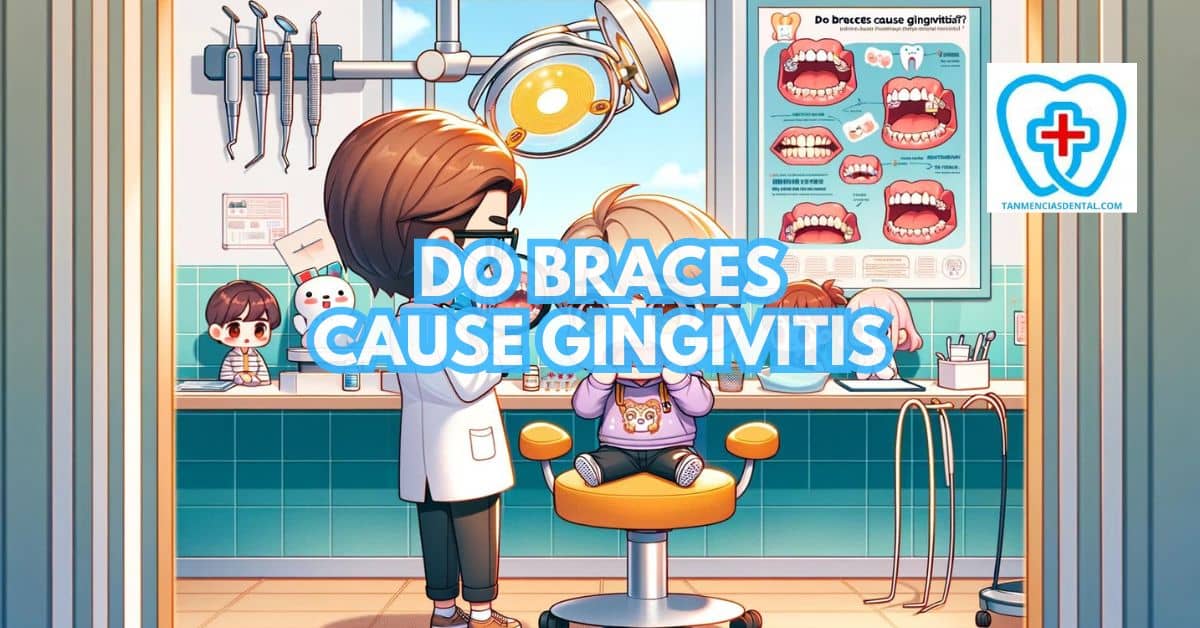Many people wonder, “Do braces cause gingivitis?”
While braces do not directly cause this gum condition, they can make it harder to clean teeth properly, leading to plaque buildup.
This buildup increases the risk of developing gingivitis if oral hygiene is not maintained.
Understanding the link between braces and gum health is crucial for preventing issues during orthodontic treatment.
We’ll explore how braces affect the gums and provide tips for keeping them healthy.
1. Understanding the Connection Between Braces and Gingivitis
Braces can increase the risk of gum disease by making it harder to clean the teeth effectively.
The brackets and wires create small spaces where food particles and plaque can get trapped, leading to swollen gums with braces.
This plaque buildup, if not removed, causes gum irritation, resulting in symptoms like redness, swelling, and bleeding.
While braces treatment complicates oral hygiene, it’s important to remember that gum disease is preventable with proper care.
Using special tools like interdental brushes and water flossers can help clean around the braces more thoroughly.
Additionally, regular dental checkups and professional cleanings during braces treatment are essential for maintaining gum health.
By paying attention to oral hygiene, you can lower the chances of developing gingivitis while wearing braces.
🦷 How to Recognize Broken Tooth Decay Before It Becomes a Major Problem
2. The Impact of Orthodontic Treatment on Gum Health
Orthodontic treatments, like braces, aim to improve dental alignment, which can ultimately benefit overall gum health.
However, gingivitis with braces is a common concern, as the brackets and wires can lead to challenges in maintaining proper oral hygiene.
In the early stages of braces treatment, you may notice gum swelling and increased sensitivity as your mouth adjusts.
If plaque builds up around the braces and is not adequately removed, it can lead to bleeding gums, a sign of gingivitis.
Left untreated, this can progress to more severe gum diseases, making early detection and prevention essential.
Regular visits to your orthodontist, along with good oral hygiene habits, help ensure that the treatment supports both teeth and gum health.
With proper care, the benefits of orthodontic treatment can be achieved without compromising the health of your gums.
🦷 Understanding the High Costs of Dental Implants: Why Are They So Expensive?
3. How Different Braces Affect Your Gums
Different types of braces can impact your gum health in various ways.
Traditional metal braces have strong brackets and wires that can make cleaning more difficult, increasing the risk of plaque buildup.
Ceramic braces are similar to metal braces but use tooth-colored materials, which may slightly reduce plaque accumulation but still require careful cleaning.
Clear aligners like Invisalign are removable, allowing easier access for brushing and flossing, which can help lower the risk of gingivitis.
However, it’s important to keep the aligners clean and follow good oral hygiene practices to maintain healthy gums.
🦷 What to Do If You Have a Broken Tooth with an Exposed Nerve
4. Debunking Myths: Do Braces Really Cause Gingivitis?
There is a common misconception that braces are a direct cause of gingivitis.
In reality, braces make cleaning teeth more challenging, which can lead to gingivitis if oral hygiene is neglected.
The key to preventing gingivitis is maintaining an effective oral hygiene routine tailored to life with braces.
Orthodontists often provide specific recommendations for brushing and flossing to help patients avoid gum issues.
By following these guidelines, patients can keep their gums healthy throughout their orthodontic journey.
🦷 Effective Strategies for Maintaining Healthy Teeth Without Brushing

5. The Importance of Oral Hygiene While Wearing Braces
Good oral hygiene is crucial for preventing gingivitis, especially for those wearing braces.
Braces can trap food particles and plaque around your teeth and gum line, which, if not cleaned properly, can lead to gum inflammation.
Brushing at least twice a day and using interdental cleaners are essential steps in removing the debris that accumulates around braces.
Flossing daily with tools like floss threaders or water flossers specifically designed for braces can significantly help in maintaining gum health.
Also, antiseptic mouthwash can assist in reducing plaque and preventing gingivitis.
🦷 Dentist vs. Doctor: Which Professional Should You Turn to for Your Health Issues?
6. Tips for Maintaining Healthy Gums During Orthodontic Treatment
To maintain healthy gums while wearing braces, it is important to adopt a comprehensive oral care routine.
This includes using toothbrushes with soft bristles and a small head to reach all areas around the braces.
Changing your toothbrush every three months or sooner if the bristles are frayed ensures efficiency in cleaning.
Scheduling regular dental cleanings and checkups allows for the professional removal of plaque and tartar that might be missed during daily brushing.
Patients should also be vigilant about any changes in their gum health and report any signs of redness, swelling, or bleeding to their dentist promptly.
🦷 Is It Ever Too Late to Start Brushing Your Teeth? Why a Brighter Smile Is Always Possible!
7. Preventing Gingivitis: Best Practices for Patients with Braces
Preventing gingivitis while wearing braces involves more than just regular brushing and flossing.
Patients should educate themselves on the proper techniques to clean around brackets and wires effectively.
Using fluoride toothpaste and rinses can strengthen tooth enamel and help protect against decay under the brackets.
Avoiding sticky and sugary foods can decrease the likelihood of plaque buildup and gum irritation.
Furthermore, wearing a mouth guard during sports activities can protect braces and prevent injuries that might compromise gum health.
🦷 Dentist vs. Orthodontist: Key Differences in Dental Care Explained
8. Seeking Professional Help: How to Address Gingivitis While Undergoing Orthodontic Treatment
If signs of gingivitis are observed, it’s important to seek professional help immediately.
Dentists and orthodontists can offer specialized treatments and advice to manage and reverse gum inflammation effectively.
This may include more frequent professional cleanings, prescribed medicated mouthwashes, or adjustments to the orthodontic appliances.
In some cases, temporary removal of the braces might be necessary to thoroughly treat severe gum conditions.
Early intervention is crucial to prevent the progression of gingivitis to more severe periodontal diseases.
🦷 Essential Facts About Dry Brushing Your Teeth That You Should Know!
9. The Role of Diet in Managing Gum Health with Braces
Diet plays a significant role in maintaining gum health, especially when you have braces.
Consuming a balanced diet rich in fruits, vegetables, and dairy products can provide the necessary nutrients to strengthen gums and teeth.
Foods high in vitamin C, like oranges and broccoli, are particularly beneficial as they help repair tissues and reduce inflammation.
It is advisable to avoid hard and sticky foods that can damage braces and become trapped, leading to increased plaque buildup.
Drinking plenty of water helps cleanse the mouth and remove food particles that may lodge in and around the braces.
🦷 Is Brushing Your Teeth Three Times a Day Too Much? Insights from Dentists
10. Regular Dental Visits: Essential for Orthodontic Patients
Regular dental visits are crucial for everyone, but they are especially important for patients undergoing orthodontic treatment.
These checkups help monitor the health of the gums and teeth, ensuring that the braces are not causing any underlying damage.
Dentists can also perform professional cleanings to remove plaque and tartar buildup that is difficult to eliminate with regular home brushing and flossing.
Such visits can catch early signs of gingivitis, allowing for timely treatment before the condition worsens.
In addition, orthodontists can adjust the treatment plan based on the progress of the dental health observed during these visits.
🦷 Can Neglected Tooth Decay Be Life-Threatening? The Risks of Poor Dental Health
11. How Technological Advances in Orthodontics Are Improving Gum Health
Technological advances in orthodontics, such as the development of clear aligners and lingual braces, are contributing significantly to improved gum health.
These innovations often reduce the amount of plaque buildup as they are easier to clean compared to traditional braces.
Materials used in modern braces are also more compatible with the body and less likely to irritate the gums.
Digital imaging and customized treatment plans ensure that the braces fit better and exert optimal pressure without damaging the gums.
These technological improvements not only enhance the effectiveness of orthodontic treatments but also make maintaining oral hygiene much easier.
🦷 Is It Possible to Get Gingivitis from Kissing? Debunking Myths About Oral Hygiene and Romance
👨⚕️ Conclusion
Maintaining gum health while pursuing orthodontic treatment is a manageable task with the right knowledge and tools.
By understanding how braces can impact gum health and taking proactive measures, patients can enjoy the benefits of a straighter smile without compromising their oral health.
Regular oral hygiene practices, appropriate dietary choices, and frequent dental visits play pivotal roles in this balance.
As orthodontic technologies continue to advance, they provide even greater opportunities for patients to maintain excellent oral health.
Ultimately, the goal is to achieve a healthy, beautiful smile with well-cared-for gums and teeth.
😊 Self-Promotion
Visit us at Tan-Mencias Dental Clinic in Parang, Marikina City, where your smile and dental health are our top priorities!
Our friendly and professional team is here to provide you with high-quality dental care in a comfortable setting.
If you have any questions or would like to schedule an appointment, feel free to call us at 9171451074.
You can also reach out through our Facebook page or by filling out our online form for your convenience.
We look forward to helping you achieve a healthy, beautiful smile at Tan-Mencias Dental Clinic!

